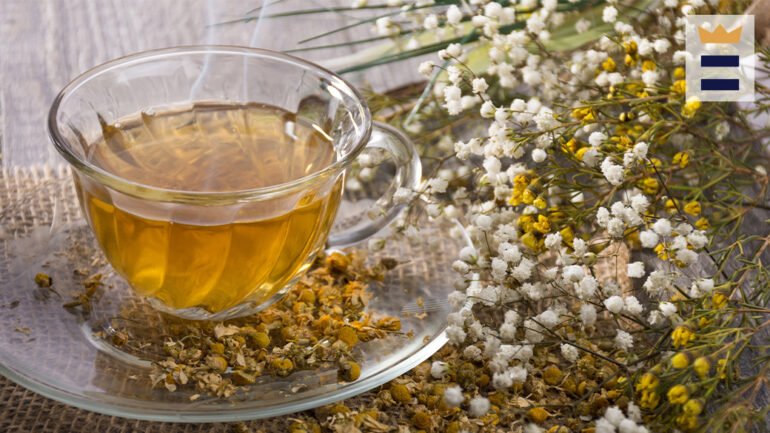People are switching to herbal teas, such as chamomile tea, from other caffeinated teas for the many health benefits they offer in addition to being a caffeine-free alternative.
Hailing from the Asteraceae or the sunflower family, this annual plant is scientifically referred to as Matricaria chamomilla or Matricaria recutita. In colloquial usage, however, it goes by different names, which include German chamomile, wild chamomile, and scented mayweed.
The M. Recutita variant is primarily used for commercial purposes, such as the manufacture of chamomile-based herbal supplements and cosmetic products. While M. Recutita remains the predominant source, other species of genus Matricaria including Chamaemelum nobile, or Roman chamomile, are also used for deriving commercial chamomile.
The active component in chamomile is bisabolol, which has anti-irritant, anti-inflammatory, and antimicrobial properties. (1)
Chamomile is also endowed with a generous supply of health-promoting and health-restorative antioxidants and vital oils that may play a role in lowering your risk of several diseases, including heart disease and cancer. (2)
From skin care products and natural cosmetics to aromatherapy, chamomile has made its mark in a wide array of arenas. Popular culture seems obsessed with chamomile tea to unwind after a long, hard day.
However, the soothing prowess of this drink is not a recent discovery. For ages, people have resorted to this wonder tonic to keep both their mind and body healthy.
The great many medicinal and beauty perks aside, this soothing drink is also easy on the taste buds due to its subtle earthy taste that has a hint of sweetness.
How to Prepare Chamomile Tea
Both the fresh and dried flowers of chamomile have been used to make tea for centuries to cure a number of health problems.
To make the tea:
- Add 1 teaspoon of dried chamomile flowers to 1 cup of hot water.
- Cover the cup, let the flowers steep for 5 minutes, and then strain it.
- Add a little raw honey to the tea and drink it while it is still warm.
You can also buy ready-to-use chamomile tea bags.
Benefits of Chamomile Tea
For use in health and beauty remedies, chamomile is also available in the form of fluid concentrate, oil, tinctures, creams, and lotions.
Here are some health benefits of chamomile that deserve your attention.
1. Helps with sleep issues
If you have difficulty sleeping, drinking chamomile tea can benefit you immensely. The herb works as a mild tranquilizer and sleep inducer, due to its rich dose of flavonoids that signal your brain to release serotonin and dopamine for a good night’s rest. (3) The herb also relaxes your muscles and nerves, which in turn promotes sleepiness.
A study published in Complementary Therapy in Medicines found that the use of chamomile extract can significantly improve sleep quality among elderly people. (4)
Another study found that chamomile tea may be recommended to postpartum women as a supplementary approach to alleviating depression and sleep quality problems. (5)
In addition, chamomile is great for sleep apnea, as its anti-inflammatory effects help get rid of obstruction in the airways that causes snoring. (3)
How to use:
- Experiment with how much chamomile tea is right for you and the optimal time to drink it before bed. A general recommendation is to drink a cup of warm chamomile tea 1 hour before bedtime to relax your nerves and muscles.
- Alternatively, prepare a massage oil with 1 part chamomile oil and 2 parts olive oil or coconut oil. Using this oil mixture, massage the back of your neck and feet daily before going to sleep.
2. Relieves headaches
Whether you suffer from tension headaches or migraines, chamomile may offer you quick relief.
Chamomile has anti-inflammatory, antispasmodic, and soothing properties attributed to its active ingredients chamazulene and bisabolol. These compounds are in higher concentrations in German than in Roman chamomile. They act as a natural profen (a nonsteroidal anti-inflammatory drug) and help relieve pain. (6)
In fact, some research suggests drinking chamomile tea regularly can help cut the frequency and severity of migraine attacks. (7)
For headache and migraine relief, drinking chamomile tea 3 or 4 times on a daily basis may be warranted. Consult your healthcare team if you want to try chamomile for headache relief.
3. Calms muscle pain and spasms
This herb also aids in getting rid of muscle pain and soreness. Chamomile may raise the level of glycine, a naturally occurring amino acid that may play a role in calming your nerves and muscles.
Also, this herb has several flavonoids with anti-inflammatory properties, which may promote faster healing of sore muscle tissues.
A 2010 study published in Molecular Medicine Reports sheds light on the several medicinal properties of chamomile, including anti-inflammatory and muscle-relaxing properties. (3)
How to use:
- Prepare a massage oil with 1 part chamomile essential oil and 2 parts carrier oil such as coconut oil. Use this oil mixture to massage the affected area to get quick relief from muscle pain and spasms.
- Also, drink chamomile tea 2 or 3 times a day to help relax sore muscles.
4. Keeps stress under control
Chamomile is an effective herb that may play a role in keeping your stress level under control. Stress is linked to many health problems, from insomnia to heart trouble. (3)
The herb’s calming and soothing nature has a sedative effect on the central nervous system that helps reduce stress and anxiety.
A study published in the Journal of Gorgan University Medical Sciences found that chamomile tea can reduce the severity of dyspnea and anxiety in patients with chronic heart failure. (8)
Another study suggested that chamomile may have modest anxiolytic activity in patients with mild to moderate generalized anxiety disorder (GAD). Future studies are needed to replicate these observations. (9)
How to use:
- Add a few drops of chamomile essential oil to warm bath water and soak in it for 15 minutes to soothe your nerves and reduce stress.
- Also, drink 2 to 3 cups of chamomile tea daily.
5. Relieves menstrual cramps
Chamomile is also beneficial for females who have to bear the pain of menstrual cramps every month. (10)
A cup of chamomile tea can relax the uterus muscles and stop them from cramping during your period. As mentioned above, this herb helps release the amino acid glycine, which can help ease muscle spasms.
A study published in the Iranian Journal of Obstetrics, Gynecology and Infertility finds chamomile tea an effective therapy in relieving the pain originating from primary dysmenorrhea and its consequent psychosocial problems. (11)
Its anti-inflammatory and antispasmodic properties can also relax the uterus and ease the spasmodic contractions that cause pain during menstruation.
Just 2 to 3 cups of chamomile tea per day may help prevent painful discomfort with menstruation.
6. Helps control diabetes
Some studies have found that chamomile tea can lower blood sugar in people with diabetes. (12)(3)(10)
A 2016 study found that short-term intake of chamomile tea has beneficial effects on glycemic control and antioxidant status in patients with type 2 diabetes mellitus. Researchers concluded more research is needed with a larger sample size and longer duration to verify the effects chamomile may have on type 2 diabetes. (13)
Remember to consult your healthcare team before adding chamomile to your diet if you have, are at risk of, or are taking medication for type 2 diabetes.
7. Treats stomach problems
The herb chamomile is rich in several essential oils that may be beneficial for the digestive system and help treat diarrhea, abdominal cramping, inflammation, bloating, nausea, and gas. If you suffer from digestive problems, adding chamomile to your diet may give you relief. (3)(14)
It soothes the intestinal walls, provides relief from sudden pains, and eliminates gas and bloating. (15)
Drinking chamomile tea 2 or 3 times a day may help provide digestive relief, but individual results may vary.
As this herb is mild in nature, chamomile also works as the perfect antidote for infants who are often susceptible to colic, diarrhea, and fever. (16)
8. Supports weight loss
Drinking herbal tea, such as chamomile tea, may be a healthy habit for people trying to shed some pounds.
Some research suggests chamomile may stimulate gastric secretions and promotes fat and cholesterol breakdown, which is important for weight loss.
A study reports drinking a cup of tea made of chamomile, gentian, or dandelion root before each meal stimulates the production of gastric juices, which may aid in weight loss. While this sounds promising, a review on using herbal remedies for weight loss suggests an herb cannot simply melt fat away. (17)
If you’re on a weight loss diet, include a cup of chamomile tea right before a meal or in place of other high-calorie drinks.
9. May heal mouth ulcers
Chamomile is also good for healing mouth ulcers. It helps ease the pain and discomfort as it has a soothing effect on the mucous membranes lining the mouth. Plus, when used as a mouth rinse, it helps prevent canker sores and other infections. (18)
A study published in the Journal of Clinical and Experimental Dentistry found that a chamomilla mouth rinse was effective in the treatment of recurrent aphthous stomatitis (RAS), controlling the pain and burning sensation without producing any adverse side effects, and can be advised as an alternative RAS treatment. (19)
How to use:
- Bring 1 cup of water to a boil.
- Add ½ tablespoon of dried chamomile flowers in it and allow them to steep for 10 minutes.
- Use this solution as a mouth rinse 3 or 4 times daily until you get relief.
Note: Do not swallow this strong chamomile tea as it may cause nausea and vomiting.
10. Keeps skin healthy
Chamomile is a good source of antioxidants, and antioxidants help fight free radicals in the body that can damage skin cells. Therefore, a diet high in antioxidants, with the inclusion of chamomile tea, may help prevent skin damage. (20)
This herb is also very effective in fighting bacteria, thus helping to prevent acne and other skin problems. (21)
Moreover, it possesses amazing healing and soothing properties that help soothe insect bites, chicken pox, wounds, burns, bruises, sunburns, rashes, and inflamed skin. Chamomile is also well known for easing discomfort caused by conditions like eczema, psoriasis, diaper rash, and other skin irritation. (22)
How to use:
- Steep a cup of chamomile tea and allow it to cool. Dip a cotton ball in the tea and rub it over the affected skin. Wait for 10 minutes, and then rinse it off with cool water. Do this once daily to enjoy healthy and glowing skin.
- Consult your doctor before putting chamomile on open or infected skin wounds.
- You can also use hot chamomile tea to steam your face from time to time and open your pores to get rid of impurities.
11. Reduces dark eye circles
Chamomile’s anti-inflammatory nature may help reduce the swelling around your eyes. It has been used as a remedy for swelling, but more evidence-based research is needed. (23)(3)
Applying chamomile directly on the under eye may help remove dark circles around the eyes.
How to use:
- Steep one or two chamomile tea bags in 1 cup of hot water for 5 minutes.
- Remove the tea bags, and put one in the refrigerator and the other on the kitchen counter.
- First, put the tea bag from the kitchen counter on your closed eyelids for 5 minutes.
- Next, place the refrigerated tea bag on your eyelids.
- Repeat this treatment as often as you like.
Also, drink 2 to 3 cups of chamomile tea to reap its antioxidant and anti-inflammatory benefits.
12. May help fight cancer
Science has recently turned its attention to chamomile as a potential healing aid for the management of cancer patients. A number of studies have expounded upon the anticancer activity of chamomile with regard to cancerous tumor growth in particular.
Evidence suggests that the antioxidant apigenin, which is a major bioactive constituent of chamomile, helps combat breast, ovarian, prostate, and skin cancers by inhibiting cancer cell proliferation. (24)(3)(10)
In a study published in the Journal of Agriculture and Food Chemistry, it was observed that exposure to chamomile extracts minimally inhibited the growth of normal cells and significantly decreased cell viability in various human cancer cell lines. (25)
More research is needed on chamomile and its effects on cancer growth, but these studies suggest chamomile may play a role in lowering the risk for certain cancers.
Precautions With Chamomile
- Those taking diabetic medications should use and consume chamomile in moderation and under the guidance of a doctor.
- Avoid this herb if you are pregnant or trying to get pregnant.
- Do not boil this herb, as its active compounds will be destroyed.
- If you are allergic to plants like ragweed, do a spot check on a small patch of skin before applying chamomile to the skin.
- Avoid chamomile in large doses, as it can cause drowsiness and vomiting.
- Avoid drinking chamomile tea if you are allergic to celery, ragweed, daisies, marigolds, or chrysanthemums.
- Do not use this herb two weeks before or after surgery.
- If you are on medication, speak with your healthcare team before adding chamomile to your diet.
- Never stop your medication or take chamomile in place of medication prescribed by your doctor.



